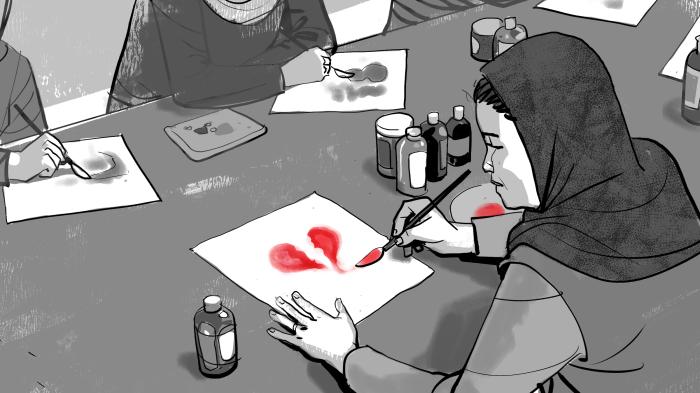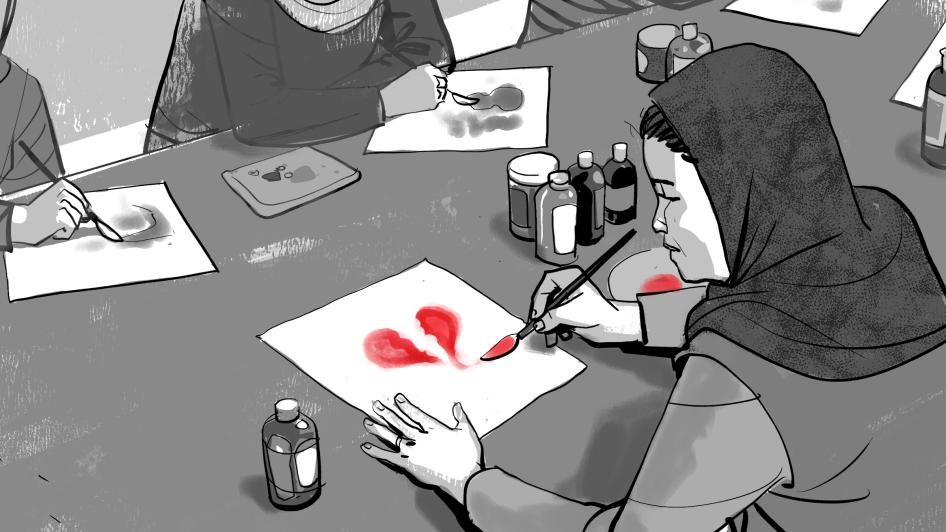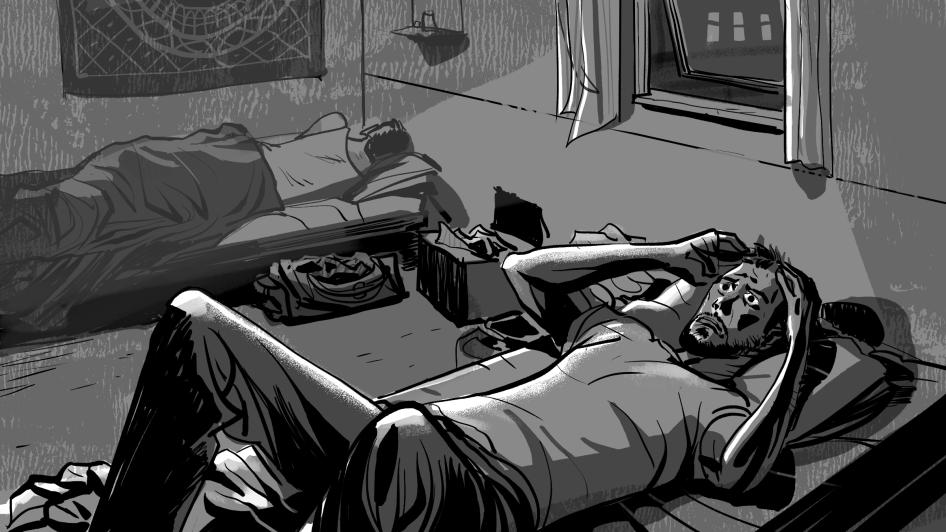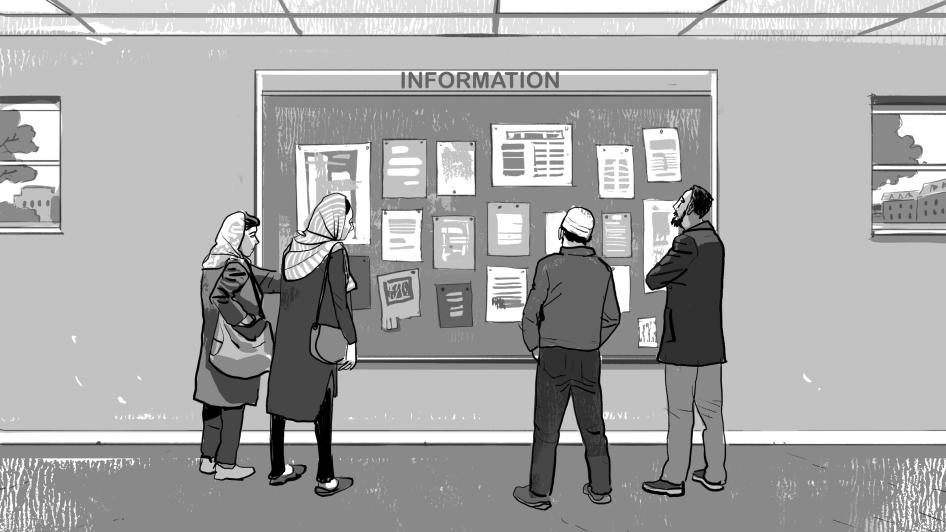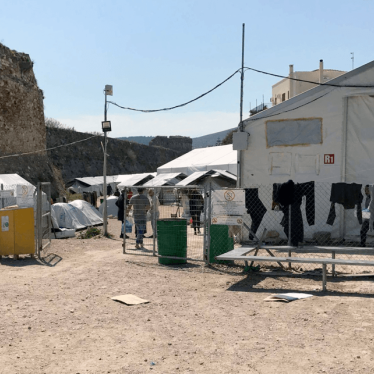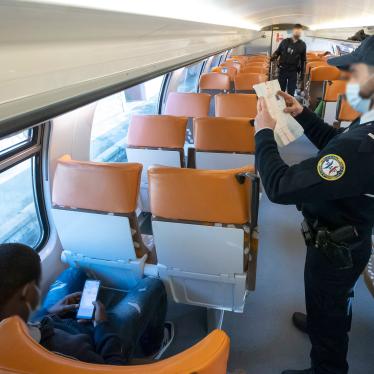(New York) – Many Afghans evacuated to France as the Taliban took over their country more than six months ago are experiencing trauma and psychological distress, Human Rights Watch said today. While France has provided important support to evacuees, including many with professional ties to the country, there remains a significant gap in terms of urgent and adequate psychosocial support.
As Taliban forces took control of Afghanistan in August 2021, Afghans who had worked with foreign governments and militaries, and in Afghanistan’s government, military, and security positions found themselves at heightened risk of persecution. Journalists and others who worked for foreign nongovernmental groups in various capacities, including promoting human rights and democracy, found themselves in the same position. Many fled the country at short notice, in some cases leaving behind family members.
“Afghans evacuated to France faced severely traumatic events and many continue to struggle with their mental health,” said Jonas Bull, assistant disability rights researcher at Human Rights Watch. “As they navigate a new environment and language while managing feelings of isolation and trauma, France should provide everyone with quality mental health support.”
With three million people fleeing Ukraine in the first three weeks following Russia’s invasion, the situation of Afghans in France provides important lessons for receiving countries on how they can make mental health support a priority for asylum seekers.
The evacuees faced immense hurdles to reach the Kabul airport in Afghanistan, in many cases being threatened, harassed, and beaten at Taliban checkpoints. Women faced particular scrutiny from the Taliban. Some of those who made it through the checkpoints said they faced humiliating treatment. Some were separated from loved ones in the chaos of evacuations and had to leave them behind. Many Afghans had already experienced severe forms of trauma before these events, during Afghanistan’s decades of war.
As Kabul fell to the Taliban, the French government opened “Operation Apagan” to evacuate more than 3,000 people to safety, including 2,630 Afghans, between August 15 and 26, 2021. Once they arrived in France, evacuees were resettled across France and entered the general asylum application system.
Human Rights Watch interviewed 28 people between November 2021 and January 2022, including 6 Afghan evacuees, as well as psychologists, doctors, humanitarian experts, representatives of nongovernmental organizations, staff of mental health centers, Afghan community leaders, interpreters, and French government officials. The interviews were conducted remotely via video and telephone as well as written exchanges with people in Paris, Lyon, Marseille, Montpellier, and Strasbourg.
Human Rights Watch found that the French government made important efforts to welcome, promptly accommodate, and support Afghan evacuees. Several representatives of nongovernmental and humanitarian organizations working to support asylum seekers consistently observed that the government prioritized asylum claims of Afghan evacuees who came to France after the Taliban takeover. One organization reported that the French asylum agency, Office français de protection des réfugiés et apatrides, organized extra appointments to swiftly evaluate asylum requests. Several evacuees interviewed received a positive response within weeks and were granted long-term stay.
France has expressed a commitment to prioritizing mental health, including by hosting the third Global Mental Health Summit in October 2021. Nonetheless, evacuees still faced significant hurdles in getting psychosocial support, Human Rights Watch found.
For many evacuees, the first days in France were filled with a mixture of relief and exhaustion. One psychologist, who was at Paris Charles de Gaulle Airport when evacuees arrived, told Human Rights Watch that people were still in shock, preoccupied with thoughts of physical survival. As time passed, they began grappling with anxiety, depression, insomnia, nightmares, and sometimes severe psychological distress, including post-traumatic stress.
One man told Human Rights Watch: “I'm in bed [in France] but my mind is in Afghanistan.” One woman said: “I love my country; I love my people. But I have a hole in my heart, I can’t do anything from here. I was in shock mode, and now I am still in shock mode. I keep forgetting things, I even forget my name.” Another woman said: “I was unable to sleep, so they [French volunteers] introduced me to this [psychosocial services] center. First, I wasn’t able to say anything, I was just crying. After one month, I came with a smile.”
With evacuees scattered across the country, some were able to swiftly access mental health services, while others struggled to find the right support. Asylum seekers are not eligible for full health coverage for their first three months in France, a requirement that was often a major barrier to accessing mental health services. Evacuees sent to remote areas of France found it more difficult to find these services, and remote support by phone or video is rare.
Several psychologists interviewed said that specialized mental health centers in French cities were, in many cases, overwhelmed with the number of people seeking psychosocial support even before the evacuees arrived. One coordinator of a center in Paris told Human Rights Watch that some asylum seekers traveled long distances to get support.
While these centers usually work with a team of qualified and trauma-informed interpreters, some evacuees had counselling sessions with external, non-specialized psychologists and without an interpreter. Interpreters are also exposed to the trauma experienced by evacuees and worry about the well-being of family still in Afghanistan. Social workers working in shelters also experience vicarious trauma and are at risk of burnout.
The right to health, which includes mental health, is recognized in international and European human rights treaties, including the International Covenant on Economic, Social and Cultural Rights (ICESCR) and the Convention on the Rights of Persons with Disabilities (CRPD). France is a party to both treaties.
In line with the provisions of these treaties and the principles of the CRPD, the provision of counseling and other mental health services should be equitably distributed throughout the country. France should make mental health support services available immediately to evacuees and other people seeking protection. Whenever a need for mental health support is voiced or identified, including in the asylum process, French authorities should direct people to psychosocial support services, ideally to dedicated centers with expertise in conflict-related trauma, qualified interpreters, and staff with relevant cultural competence and language skills. People seeking protection should be informed of the availability of support services and be able to choose the type of support most appropriate to their needs. They should have the right to withdraw from psychosocial support services at any point.
“People fleeing conflict shouldn't face the added burden of having to wait weeks to be eligible for mental health support and then finding there are no appropriate services in their area,” Bull said. “Afghans in France still need more support, and as European countries begin to welcome refugees from the Russia-Ukraine war, lessons from the Afghanistan evacuation in France underline the importance of putting mental health high on the agenda.”
Methodology
From November 2021 to January 2022, Human Rights Watch interviewed 28 people, 6 of whom are Afghan evacuees and the rest psychologists, doctors, humanitarian experts, nongovernmental group representatives, heads and coordinators of psychosocial service centers, Afghan community leaders, interpreters, and government officials. Interviews were conducted remotely in French, English, or Dari, including interpreters for Dari, via video conferencing platforms, by phone, or over email. Human Rights Watch wrote to the French Interior Ministry for further information but did not receive a response.
Human Rights Watch found that some evacuees had been interviewed repeatedly about their experiences by the media or authorities responsible for the asylum process, which some experts said compounded their anxiety and trauma. To avoid re-traumatization, Human Rights Watch limited interviews with Afghan evacuees and focused on gathering evidence from psychologists, interpreters, and others working with evacuees. Some of those interviewed are identified with pseudonyms for their security or the protection of their families in Afghanistan.
The Last Days Before Leaving Afghanistan
Before the events of August 2021, many Afghans, including those who fled, had already experienced severe forms of trauma, during the country’s decades of war. Afghanistan has been devastated by violence, and it is estimated that half of the population experiences depression, anxiety, or post-traumatic stress, which can have a disastrous impact on a person’s mental health and the well-being of their relatives and friends. Despite this, the previous government in Afghanistan only spent about US$0.26 per capita on mental health, out of $7 spent annually per capita on health services in general, leaving most Afghans without access to adequate care.
With their past work affiliations, for example as former security officials who had worked with foreign forces, evacuees faced a heightened risk of persecution by the Taliban. “Mari,” a 27-year-old woman who worked with a French humanitarian organization, said: “I had to choose between a chance to make it out alive and leave – or be killed moment by moment after [the Taliban] come to power.”
“Farhan,” a 29-year-old man from Kapisa province and a former security officer with a French humanitarian organization, whose brothers were with Afghan National Defense and Security Forces said: “They [the Taliban] tried to find me. I changed my phone number many times. They called my father saying, ‘Now we will find you.’ After that it was so difficult for me. I received a call from my father, he told me, ‘You have to find some way [to leave].’”
Airport Scenes and Evacuations
People interviewed described a fear of being exposed because of the documents they carried, which identified their previous work experiences with international organizations. Mari said: “I was worried about my documents. In one sense you had to have your documents to be evacuated, on the other side you could have risked your life holding those documents.” To avoid the risks she faced if her documents were found with her or in her home, Mari hid them in a hole in the ground while waiting at the airport gate.
Amid the chaos, some people had to leave their close family behind. Mari lost her family in the crowd. When she managed to enter the airport she called them, but her family said they would not make it because of the crowds and the constant shooting by soldiers. Mari left Afghanistan on her own. Farhan did the same. He said: “It was so difficult; my family was stopped at two or three Taliban checkpoints. I tried to wait for them one day and one night, but they did not find a way to come to the airport. I called my father again, he told me, ‘You have to go.’”
With the Taliban setting up checkpoints outside the airport, all evacuees said they were afraid of violence. “Rafi,” a journalist and documentary filmmaker, said: “That night was horrible, you saw everything. The soldiers, how they are treating people, guns firing, I saw a lot of things which were truly sad.”
Mari said a Taliban member kicked and hit her with a gun, hurting her eye and leg: “They wanted to see my documents, but I resisted – that’s why they hit me,” she said. Whenever the Taliban hit people in the crowd, people started to scream, only resulting in further violence by the Taliban, who fired warning shots in the air. “I felt I couldn’t breathe several times,” Mari said.
Children were particularly at risk due to the large crowd. “I saw that some children were lost,” Mari said. Rafi told Human Rights Watch: “I saw small children [and] babies with their mothers under the feet of everybody, but nobody cared.” Together with others he formed a circle around families to protect them, but they were unable to move closer to the gate: “Some people got disappointed and families with children started to give up,” Rafi said.
Everyone interviewed grappled – and continues to grapple – with the traumatic incidents at the airport. Thinking back, Rafi said: “I saw things that I cannot even describe. It was a total disaster. It is hard to talk about it in [just] a few minutes.”
Once inside the airport and identified as eligible for departure, everyone Human Rights Watch interviewed reported being treated kindly by the French military. Rafi said: “They were welcoming, with smiles on their faces and said, ‘don’t worry.’” Mari said: “The moment I took the flight, things got easier. At least I was not worried about being hungry or sleepless, or most important, being shot and killed by the Taliban.” She remembered many people on the plane feeling very sad and hopeless. “Zuhal”, a feminist activist and local politician, said: “We left Afghanistan with a broken heart. I’ve been crying for three months, because of our achievements, because of the things I saw at the airport.”
Mental Health Consequences for Women
Female evacuees spoke of their fears of the Taliban takeover of their country. Mari said: “I had always heard terrible stories of how [the Taliban] treated women, and we were terrified of them. We know that the Taliban doesn’t like people who worked with foreigners, and that was 50 percent of the reason I had to leave. The other 50 percent is because I am a woman and the Taliban has always been against women. They humiliate, torture and kill people, especially women.”
Zuhal, who had been working on women’s rights for several years and left Afghanistan together with her mother, said: “We were two women alone, me and my mother. As women, there were many men disturbing us, saying ‘If the Taliban find[s] out that you don’t have men, they will kill you.’” Some men at the airport offered to pretend to be their husbands or brothers to pass the checkpoints, but Zuhal refused: “I said no, if I die, I will die with the truth.” Both Mari and Zuhal said they were beaten by the Taliban. Zuhal said: “They were beating us a lot. While I was shouting, they came to me and said, ‘Don’t shout or we’ll shoot you.’” The fourth night, Zuhal and her mother finally managed to enter the airport.
Some expressed anger and frustration about the crackdown on women's rights in Afghanistan. Farhan, whose mother and sister both had been teachers, said: “Now they are at home. I don’t know why. My rights and my mother and sister’s rights are the same. If they want to go to work, they should work. What’s the problem? It is so difficult in this time, not only for my mother and sister, but for all the women of Afghanistan.”
First Days after Arrival in France
After landing in France, many were exhausted from the events of the previous days. Zuhal said: “No one had enough energy to even say hello. I slept for three days; I didn’t know where I was. After three days, I went outside and saw the people dancing and enjoying the freedom, I really loved that.” During the first days, various French organizations offered psychosocial support. Farhan recalled medical teams coming regularly and asking about their mental health. One psychologist from an emergency unit who had been at Charles de Gaulle airport in Paris observed: “What we mainly experienced was a sense of relief and exhaustion [among evacuees]. People were still in survival mode.”
After several days of quarantine in designated hotels, evacuees were allocated various types of accommodations across the country, based on a 2018 directive to equally distribute asylum seekers among departments in France. The evacuees interviewed were sent to various regions. Depending on availability and family size, some were placed in larger homes, others in shared apartments with other asylum seekers.
Mental Health Distress
Human Rights Watch research has found that asylum seekers can experience trauma before, during, and after their journey to Europe, often leading to a silent mental health crisis among people seeking refuge in the European Union. A report by the World Health Organization (WHO) on public health aspects of mental health among migrants and refugees in Europe, published in 2016, found that the rates of post-traumatic stress in refugees and asylum seekers were higher than those in the host populations.
Even though people were physically safe, many were grappling with being far away and separated from their family and friends. Farhan said that his brothers, formerly members of the Afghan military, are in hiding. His family has continued to receive calls from the Taliban asking them to reveal his whereabouts.
People had trouble adjusting to their new environment and kept reliving the trauma of leaving Afghanistan. Rafi said: “Every night I was sleeping, my soul went back to Kabul. I was dreaming the same thing almost every night.”
Throughout his time at the accommodation center for asylum seekers, Rafi was not offered the possibility of seeking mental health support: “I need someone to talk with. I think it is one of the most important things for us. It could sometimes stop those nightmares and the big depressions I had. People like me don’t talk unless there is somebody like a counselor who can listen to us. If your mental health is not good, how are you supposed to move forward?”
In addition to reliving past traumatic events, asylum seekers had feelings of isolation. Mari said: “The first few weeks were very challenging, very difficult. My mental health was absolutely destroyed. I was struggling a lot. I asked for a psychologist.” After speaking to her assigned social worker, she then received regular psychosocial support sessions and was prescribed antidepressants. However, what troubled her most was not being reunited with her husband, who already lived in France: “The situation of living in this place is affecting my mental health and my depression is getting worse while staying here. I am lonely here, I am lonely in this country,” she said.
Five of the six evacuees interviewed had already passed their interview with the authority in charge of handling asylum requests, Office français de protection des réfugiés et apatrides, with some having received recognition of refugee status, along with a resident card valid for 10 years, within weeks. While this was a huge relief, many expressed difficulties in adjusting to France, trying to rebuild identities. Farhan said: “In France, there is nobody, I am alone in this country, I don’t have any relatives, I don’t have any friends. I am alone.”
A lack of prompt and comprehensive psychosocial support to deal with the trauma of war can cause a person’s mental health to deteriorate and lead to hopelessness, frustration, and desperation. After he was relocated to Strasbourg, Farhan said: “When I want to sleep, I am thinking too much. I cannot sleep, during the night I sleep maybe three to four hours. I am in bed, but my mind is not in bed. My mind is in Afghanistan.” Despite efforts to access regular psychosocial support, Farhan said he did not receive a response for many weeks.
“I was thinking it is not good to go to the social worker and explain my problem. They would think, ‘See this guy, he’s here the first week. He will start complaining, he started the problems.’ But after three weeks of waiting, I got angry. Because all day I had a headache, I can’t eat.” When he finally managed to see a psychologist at a nearby hospital, he said he was advised to take daily walks. After some time, he went back to the social worker saying his mental health had not improved, but they became angry. The social worker told him: “You are talking too much, you need to wait.”
“Faisal,” a former military officer, said: “I don’t sleep well. I have nightmares and dream of the airport scenes. I don’t know what to do.” His wife and children, one of whom has a psychosocial disability, remained in hiding in Afghanistan. Through other Afghans in Marseille, he was referred to a psychosocial service center, which offered support.
Seeking Support and Trauma-Informed Interpretation
Studies have found that people seeking refuge in Europe face significant barriers to getting mental health care. Under French law, asylum seekers who are 18 or older only have access to emergency health care during their first three months in France, a significant barrier to receiving mental health support. Knowing this, Rafi felt uncomfortable sharing his nightmares with the social workers in the shelter: “I thought maybe these are personal things and they are there to help with the paperwork.”
Most organizations specializing in providing psychosocial support to asylum seekers and refugees, that Human Rights Watch talked to, offer their services free. But asylum seekers are faced with a long waiting list, which means waiting several months before receiving support. Following the 2021 events in Afghanistan, one psychosocial center decided to open mental health services for all Afghans, regardless of how they arrived in France. “It affects the whole Afghan community,” one psychologist said.
Zuhal was connected with a center and met with the psychologist every two weeks: “I was unable to sleep, so they [French volunteers] introduced me to this center. First, I wasn’t able to say anything, I was just crying. After one month I came with a smile.” Now, she has started a support group for Afghan women in France and has begun to make plans for her future. At the same time, Zuhal felt disheartened that, after getting her residence status, she was trying to move to Paris but had not yet found a place to stay.
So far, little has been done to provide remote services. For people like Rafi, who have been moved to a small town in southeast France and have not yet accessed local psychosocial support services, remote support services could offer a viable alternative. A coordinator at a psychosocial service center in Paris confirmed that in some cases, people would have to make long journeys to the center. She cautioned, however, that remote support has limitations in helping people in acute distress and may be less effective if the person seeking support does not have a private space during sessions. The availability of remote support could also inhibit efforts to establish local mental health services for refugees.
Many evacuees and psychologists mentioned the importance of having interpreters for psychosocial support services. Dedicated psychosocial centers usually work with an established team of trauma-informed interpreters. A psychologist working at a psychosocial center for people in exile said she held regular debriefs with the interpreter: “He would share his views and observations, and the hypothesis we can draw on the person’s psychosocial situation. They give me a chance to reflect on my own cultural and linguistic biases, and jointly discuss therapeutic approaches. […] Doing the sessions together leads to better support for the person.”
Interpreters may experience mental health challenges themselves when supporting the psychologist. Many have left relatives behind in Afghanistan and are concerned for their well-being. One interpreter working for the French asylum authorities said: “Me too, I am affected by what is happening at home, I am worried about my family and friends. I am grateful for France having welcomed me here, and I want to help people who do not know the language. But me, too, I am alone here and isolated.” She did not receive psychosocial support from the French asylum authorities during the time she worked for them as an interpreter.
Dealing with past traumatic experiences as well as the complexities of starting a new life in a foreign country will take time for Afghan evacuees, but psychosocial support is a critical component of the adjustment process. “Roya,” a 19-year-old woman who worked in a hospital run by a humanitarian organization, said: “I love my country; I love my people. But I have a hole in my heart, I can’t do anything from here. I was in shock mode, and now I am still in shock mode. I keep forgetting things, I even forget my name.”
Together with her mother, Roya started bimonthly visits with a psychologist and joined a group therapy with several other evacuees, organized by the psychologist. She also joined art therapy sessions and said: “I talked about my emotions when we went to the art therapy. They showed me some way so that I don’t stay at the shock mode. They helped me a lot. I am going to be better.”
